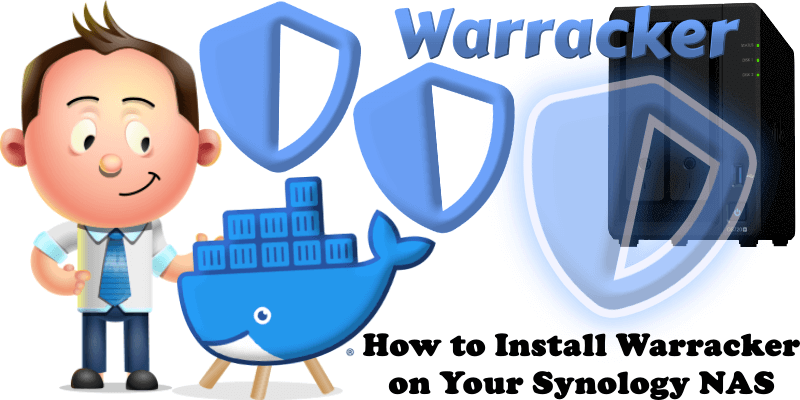
Warracker is an open-source warranty tracker for individuals and teams. With Warracker, you have at your disposal the easiest way to organize product warranties, monitor expiration dates, and store receipts or related documents. In this step by step guide I will show you how to install Warracker on your Synology NAS using Docker & Portainer.
This guide works perfectly with the latest Warracker v1.0.2 release.
STEP 1
Please Support My work by Making a Donation.
STEP 2
Install Portainer using my step by step guide. If you already have Portainer installed on your Synology NAS, skip this STEP. Attention: Make sure you have installed the latest Portainer version.
STEP 3
Make sure you have a synology.me Wildcard Certificate. Follow my guide to get a Wildcard Certificate. If you already have a synology.me Wildcard certificate, skip this STEP.
STEP 4
Go to Control Panel / Login Portal / Advanced Tab / click Reverse Proxy. Follow the instructions in the image below.
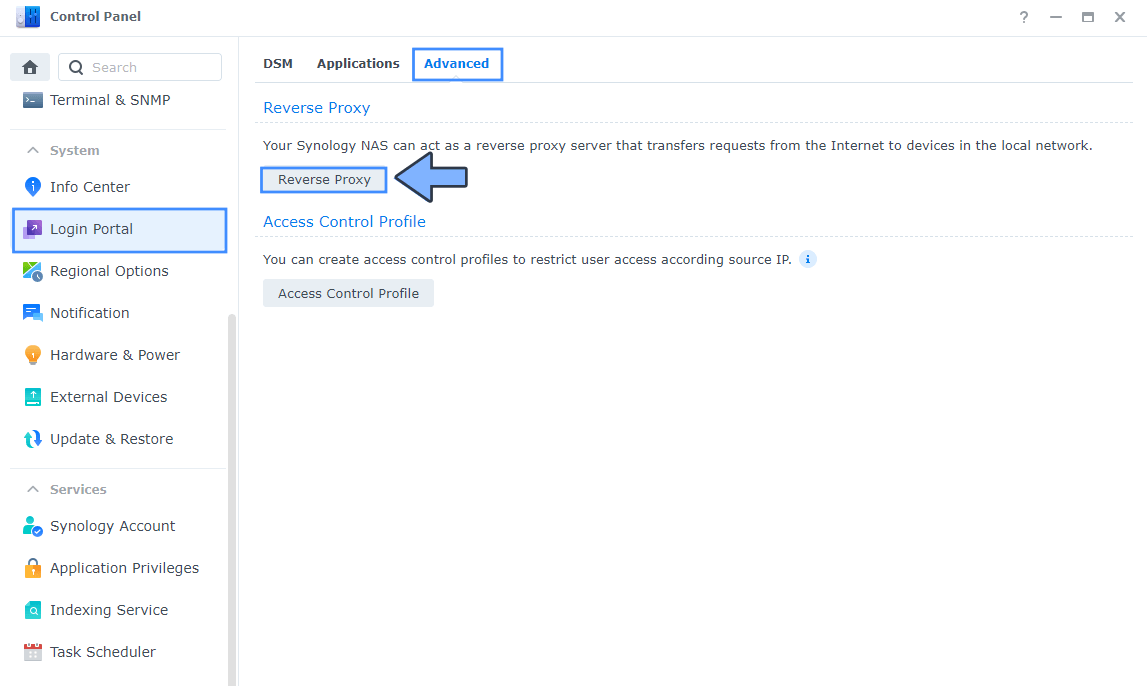
STEP 5
Now click the “Create” button. Follow the instructions in the image below.
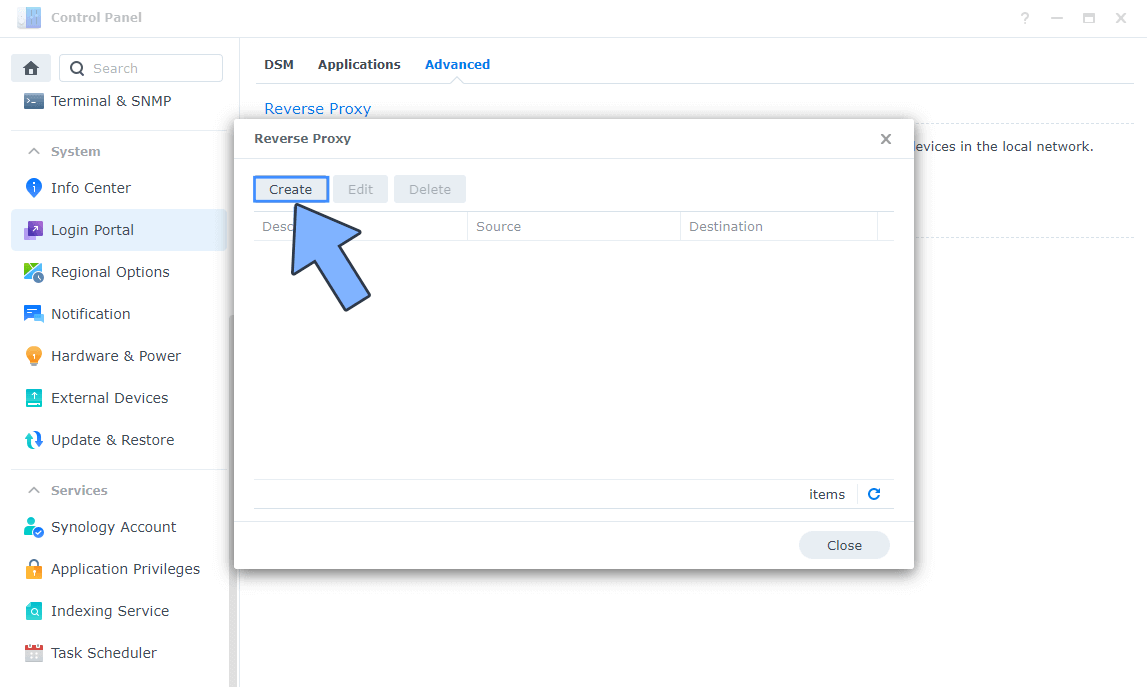
STEP 6
After you click the Create button, the window below will open. Follow the instructions in the image below.
On the General area, set the Reverse Proxy Name description: type in Warracker. After that, add the following instructions:
Source:
Protocol: HTTPS
Hostname: warracker.yourname.synology.me
Port: 443
Check Enable HSTS
Destination:
Protocol: HTTP
Hostname: localhost
Port: 5313
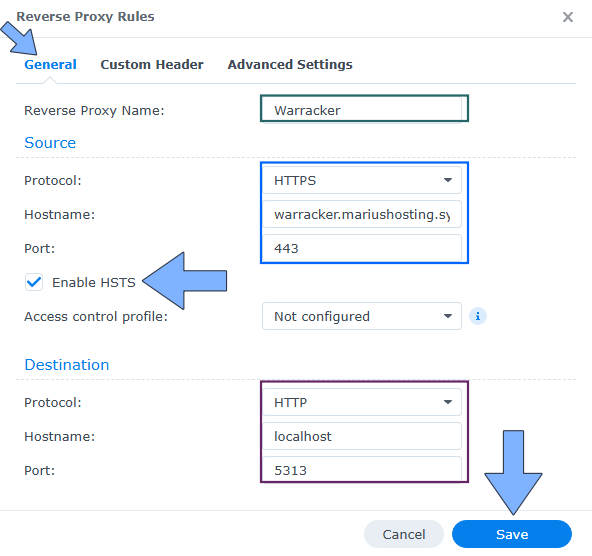
STEP 7
On the Reverse Proxy Rules click the Custom Header tab. Click Create and then, from the drop-down menu, click WebSocket. After you click on WebSocket, two Header Names and two Values will be automatically added. Click Save. Follow the instructions in the image below.

STEP 8
Go to Control Panel / Network / Connectivity / Check Enable HTTP/2 then click Apply. Follow the instructions in the image below.
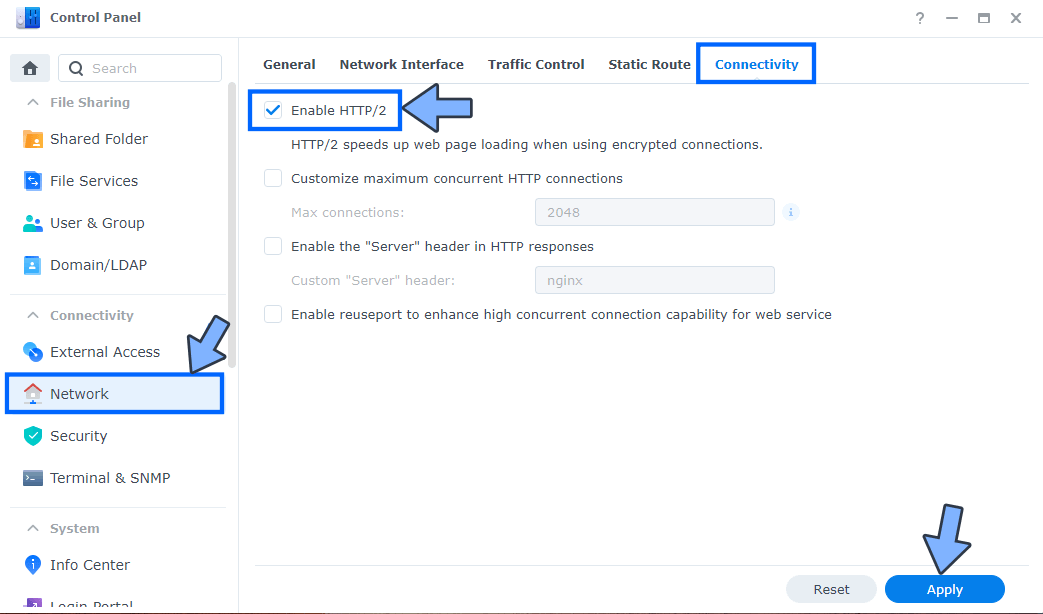
STEP 9
Go to Control Panel / Security / Advanced tab/ Check Enable HTTP Compression then click Apply. Follow the instructions in the image below.
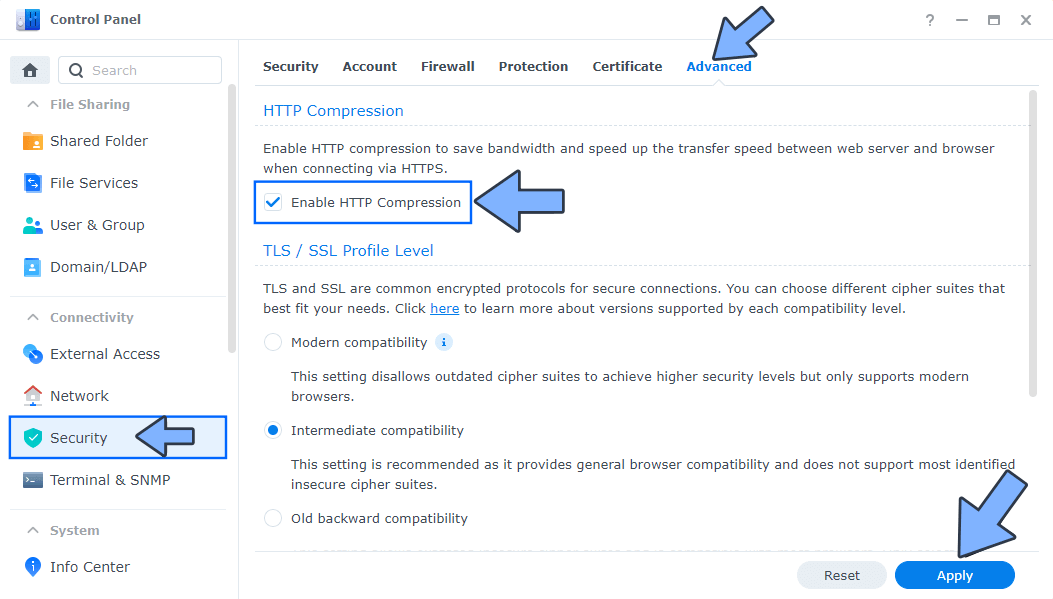
STEP 10
Go to File Station and open the docker folder. Inside the docker folder, create one new folder and name it warracker. Follow the instructions in the image below.
Note: Be careful to enter only lowercase, not uppercase letters.
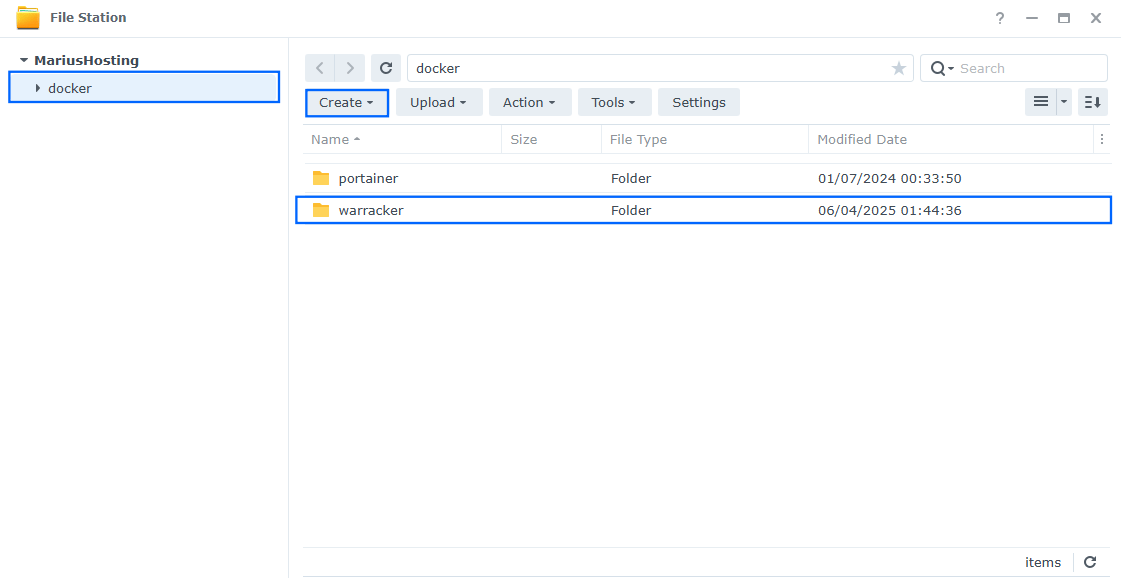
STEP 11
Now create two new folders inside the warracker folder that you previously created at STEP 10 and name them data and db. Follow the instructions in the image below.
Note: Be careful to enter only lowercase, not uppercase letters.
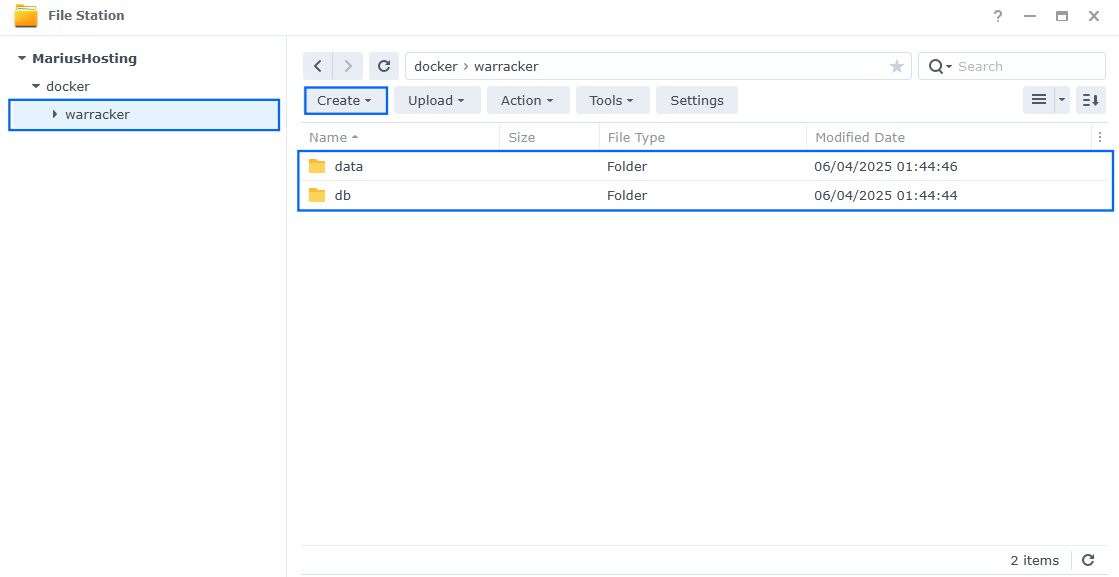
STEP 12
Follow my step by step guide on how to activate SMTP for your Gmail account. This step is mandatory. Note: If you don’t want to use the easiest way for SMTP with Google and you already have SMTP details from your own Mail Server, you can just skip this STEP and use your personalized email SMTP details instead.
STEP 13
Log into Portainer using your username and password. On the left sidebar in Portainer, click on Home then Live connect. Follow the instructions in the image below.

On the left sidebar in Portainer, click on Stacks then + Add stack. Follow the instructions in the image below.

STEP 14
In the Name field type in warracker. Follow the instructions in the image below.
services:
db:
image: postgres:18
container_name: Warracker-DB
hostname: warracker-db
security_opt:
- no-new-privileges:true
healthcheck:
test: ["CMD", "pg_isready", "-q", "-d", "warracker", "-U", "warrackeruser"]
timeout: 45s
interval: 10s
retries: 10
volumes:
- /volume1/docker/warracker/db:/var/lib/postgresql:rw
environment:
POSTGRES_DB: warracker
POSTGRES_USER: warrackeruser
POSTGRES_PASSWORD: warrackerpass
restart: on-failure:5
warracker:
image: ghcr.io/sassanix/warracker/main:latest
container_name: Warracker
healthcheck:
test: timeout 10s bash -c ':> /dev/tcp/127.0.0.1/80' || exit 1
interval: 10s
timeout: 5s
retries: 3
start_period: 90s
ports:
- 5313:80
volumes:
- /volume1/docker/warracker/data:/data/uploads:rw
environment:
DB_HOST: warracker-db
DB_NAME: warracker
DB_USER: warrackeruser
DB_PASSWORD: warrackerpass
SMTP_HOST: smtp.gmail.com
SMTP_PORT: 465
SMTP_USERNAME: Your-own-gmail-address
SMTP_PASSWORD: Your-own-app-password
SMTP_SENDER_EMAIL: Your-own-gmail-address
SMTP_USE_SSL: true
SECRET_KEY: dOxZYTTZgXKMHkqLBIQVImayQXAVWdzGBPuFJKggzcgvgPJPXpWzqzKaUOIOGGIr
FRONTEND_URL: https://warracker.yourname.synology.me
APP_BASE_URL: https://warracker.yourname.synology.me
MAX_UPLOAD_MB: 512
NGINX_MAX_BODY_SIZE_VALUE: 512M
FLASK_ENV: production
depends_on:
db:
condition: service_healthy
restart: on-failure:5
Note: Before you paste the code above in the Web editor area below, change the value for SMTP_USERNAME and type in your own Gmail address. STEP 12.
Note: Before you paste the code above in the Web editor area below, change the value for SMTP_PASSWORD and type in your own Gmail APP password. STEP 12.
Note: Before you paste the code above in the Web editor area below, change the value for SMTP_SENDER_EMAIL and type in your own Gmail address. STEP 12.
Note: Before you paste the code above in the Web editor area below, change the value for SECRET_KEY. (Generate your own Random 64 length SECRET_KEY.)
Note: Before you paste the code above in the Web editor area below, change the value for FRONTEND_URL and type in your own synology.me DDNS with https:// at the beginning that you have previously created at STEP 6.
Note: Before you paste the code above in the Web editor area below, change the value for APP_BASE_URL and type in your own synology.me DDNS with https:// at the beginning that you have previously created at STEP 6.
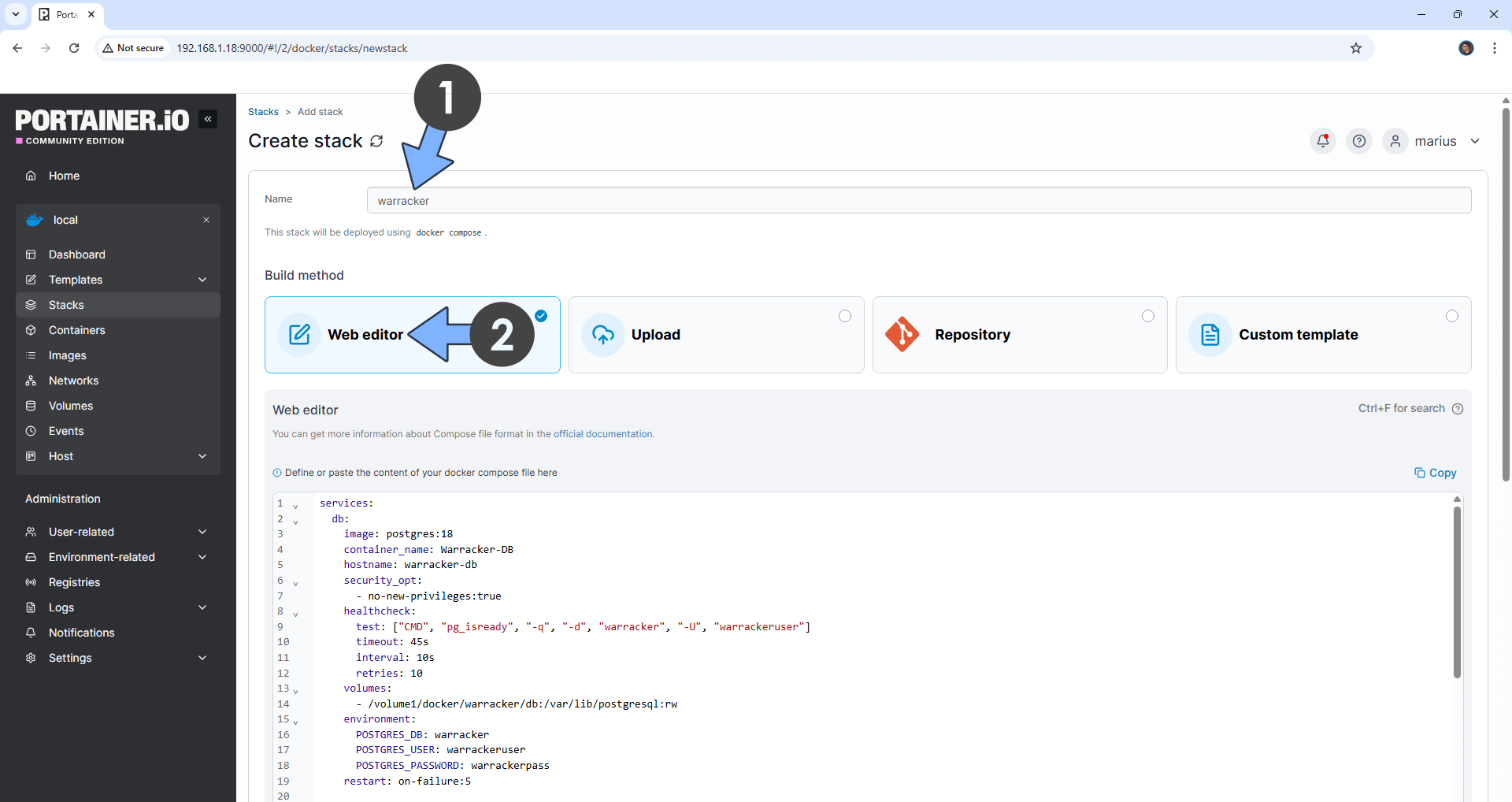
STEP 15
Scroll down on the page until you see a button named Deploy the stack. Click on it. Follow the instructions in the image below. The installation process can take up to a few minutes. It will depend on your Internet speed connection.
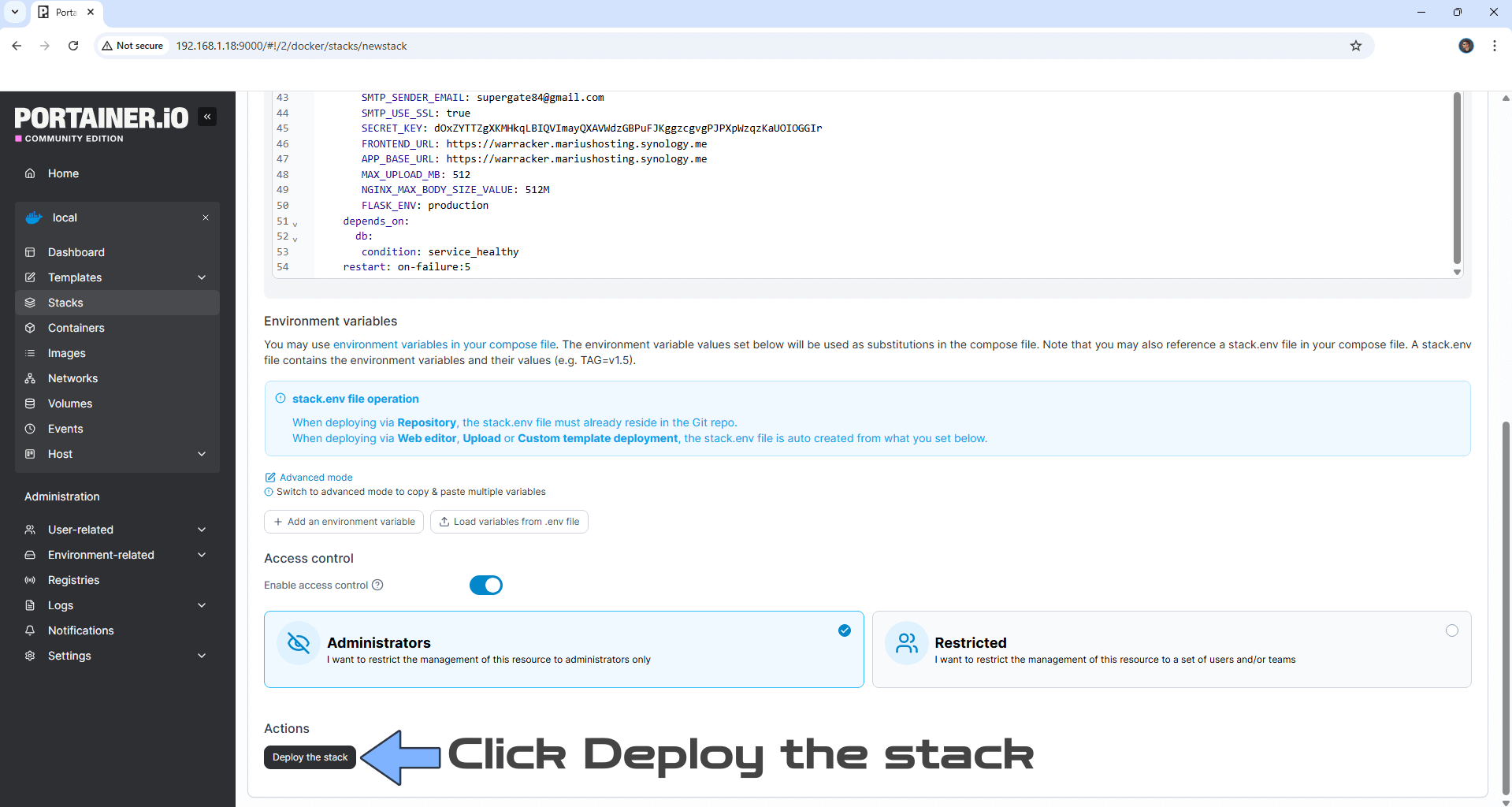
STEP 16
If everything goes right, you will see the following message at the top right of your screen: “Success Stack successfully deployed“.

STEP 17
🟢Please Support My work by Making a Donation. Almost 99,9% of the people that install something using my guides forget to support my work, or just ignore STEP 1. I’ve been very honest about this aspect of my work since the beginning: I don’t run any ADS, I don’t require subscriptions, paid or otherwise, I don’t collect IPs, emails, and I don’t have any referral links from Amazon or other merchants. I also don’t have any POP-UPs or COOKIES. I have repeatedly been told over the years how much I have contributed to the community. It’s something I love doing and have been honest about my passion since the beginning. But I also Need The Community to Support me Back to be able to continue doing this work.
STEP 18
Now open your browser and type in your HTTPS address like this https://warracker.yourname.synology.me In my case it’s https://warracker.mariushosting.synology.me If everything goes right, you will see the Warracker login page. Click Create Account. Follow the instructions in the image below.
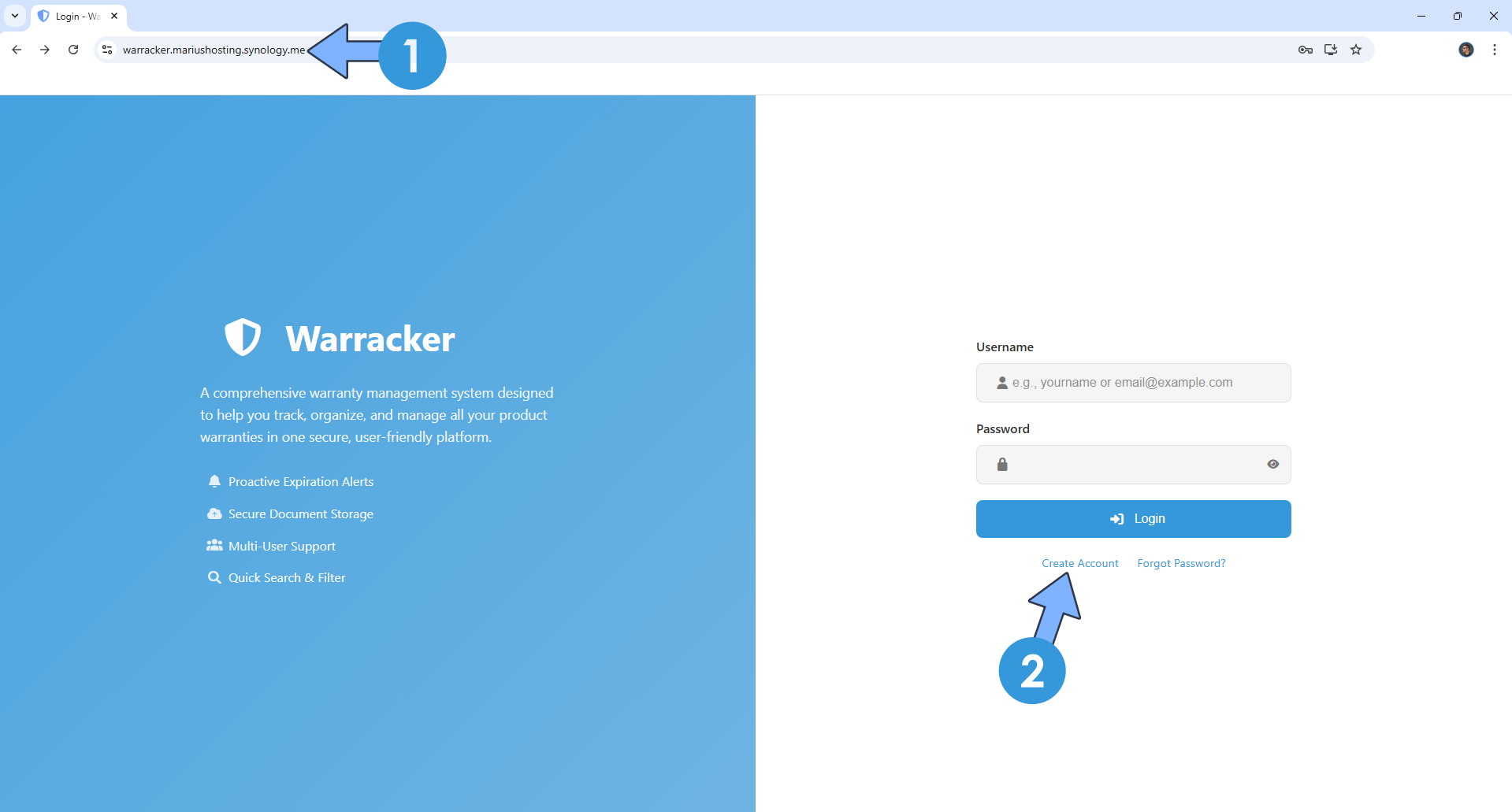
STEP 19
Type in your own details, then click Create Account. Follow the instructions in the image below.
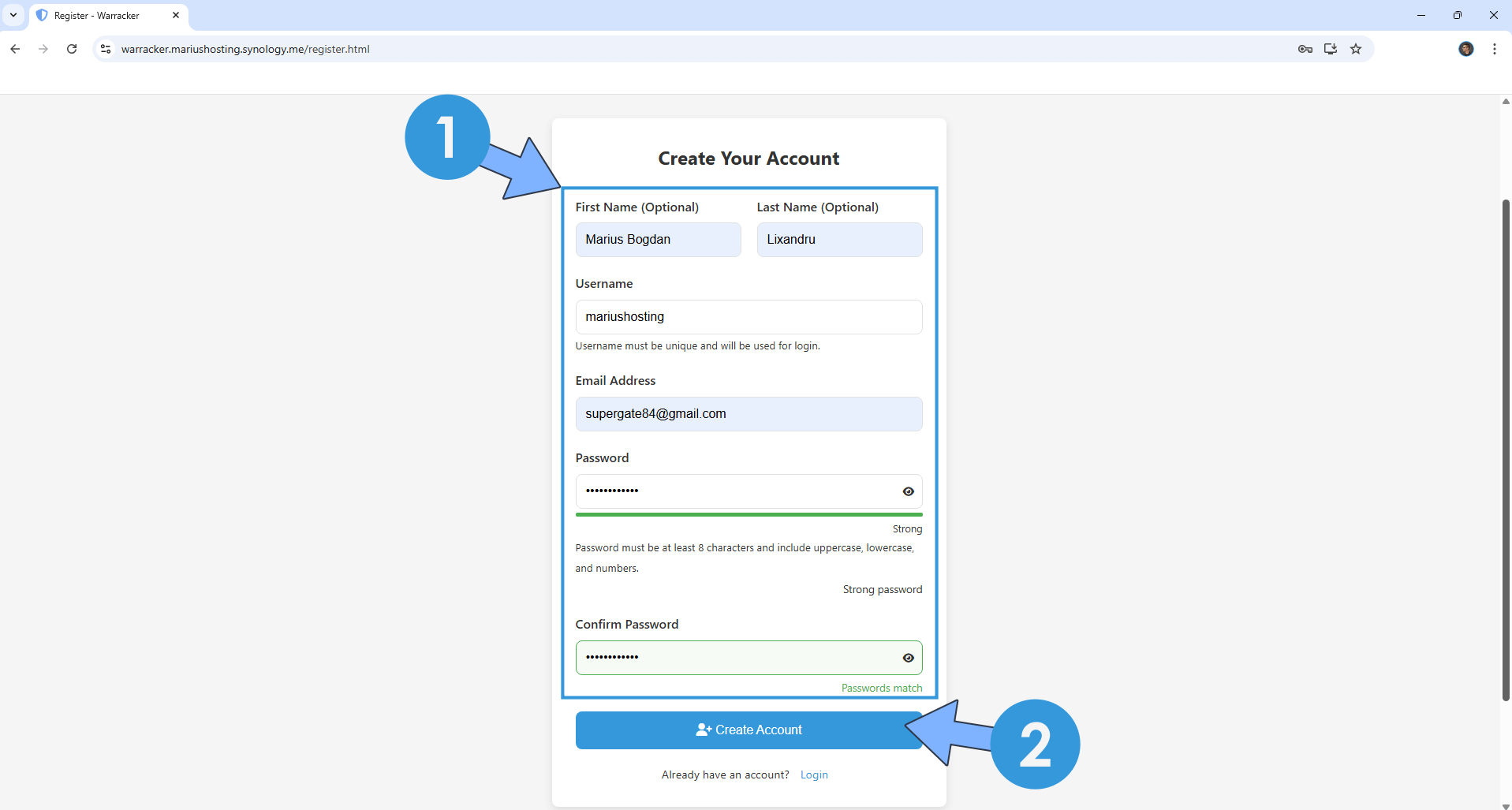
STEP 20
Your Warracker page will look like this.
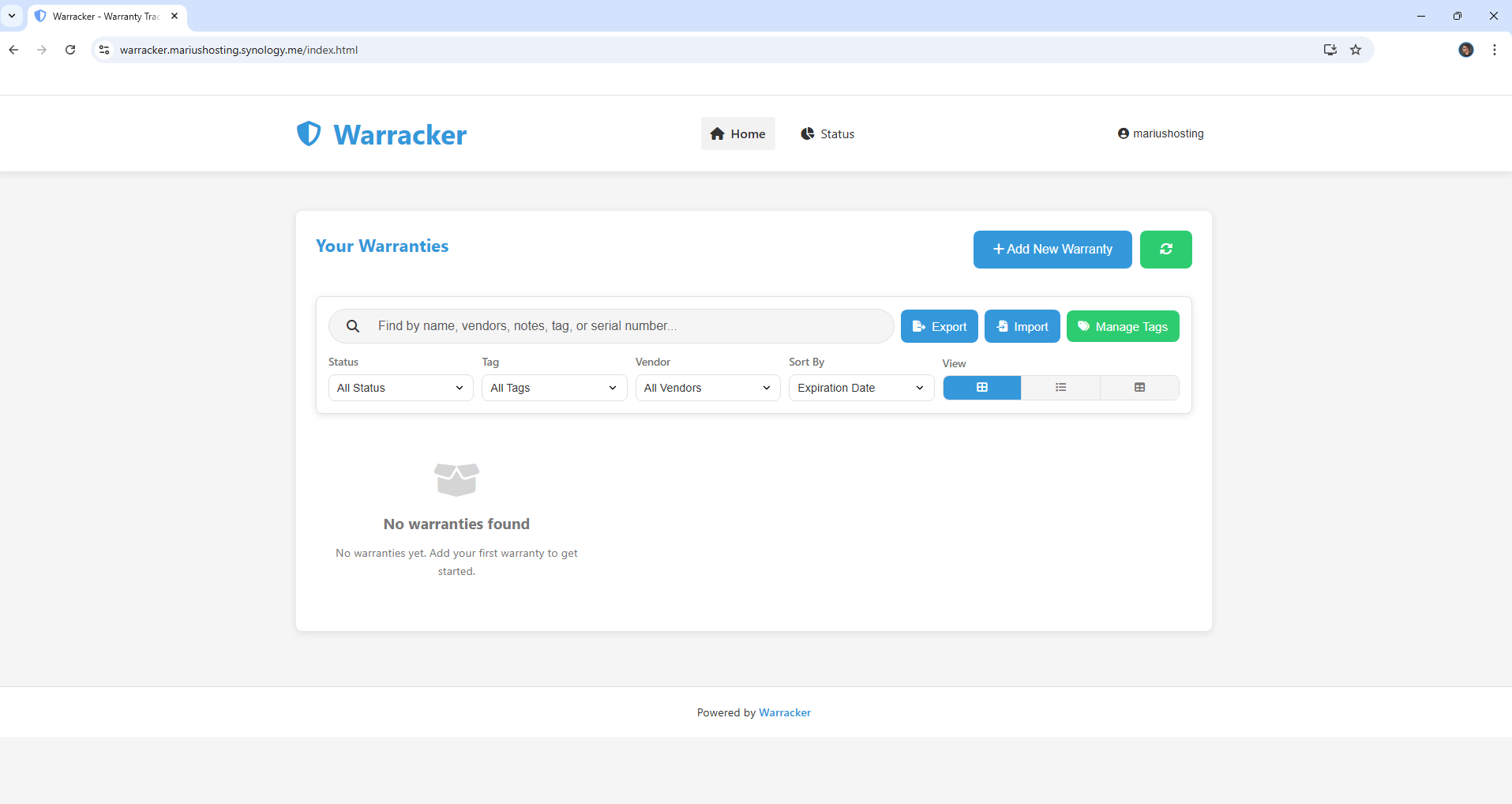
STEP 21
At the top right of the page, click on your username, then Settings. Switch to Dark mode, then add your favorite currency. Click Save Preferences. Follow the instructions in the image below.
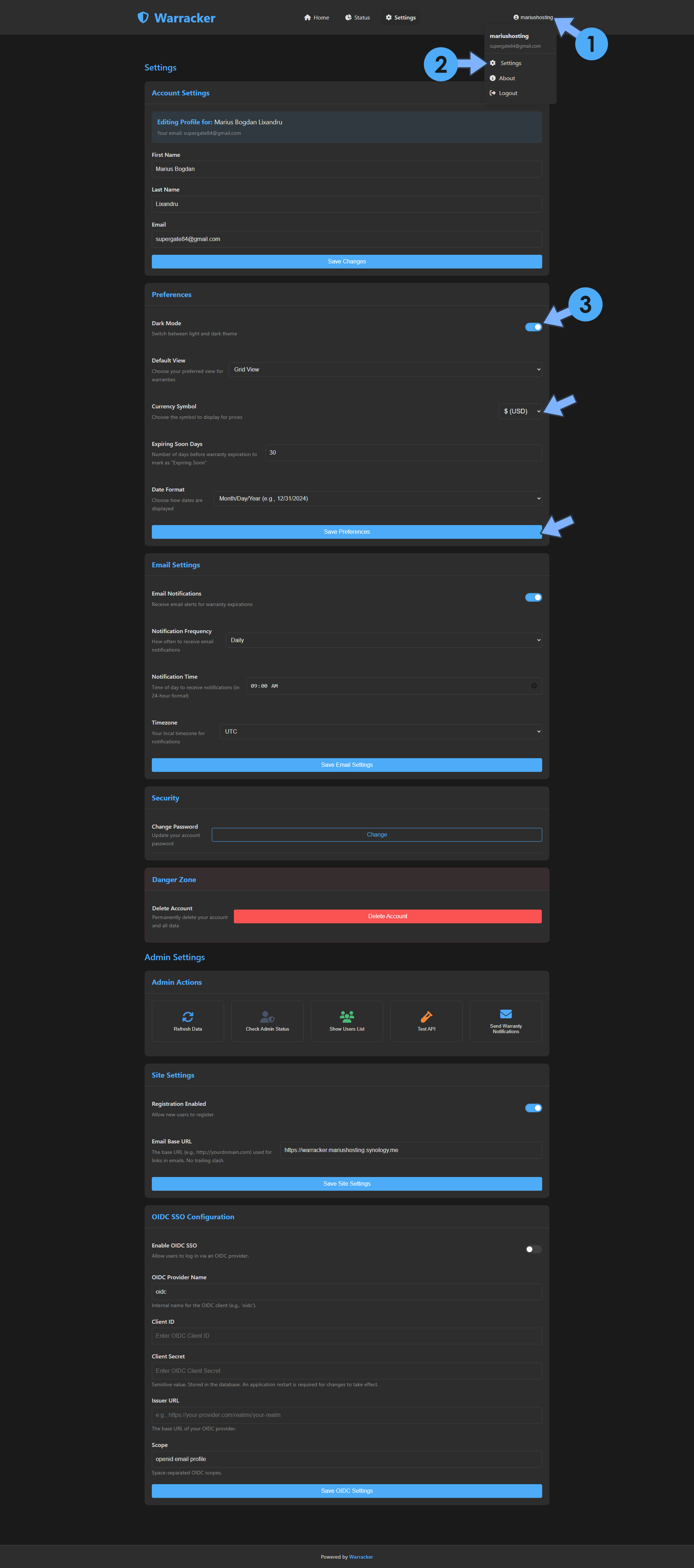
STEP 22
Click +Add New Warranty to add your first Warranty. Follow the instructions in the image below.
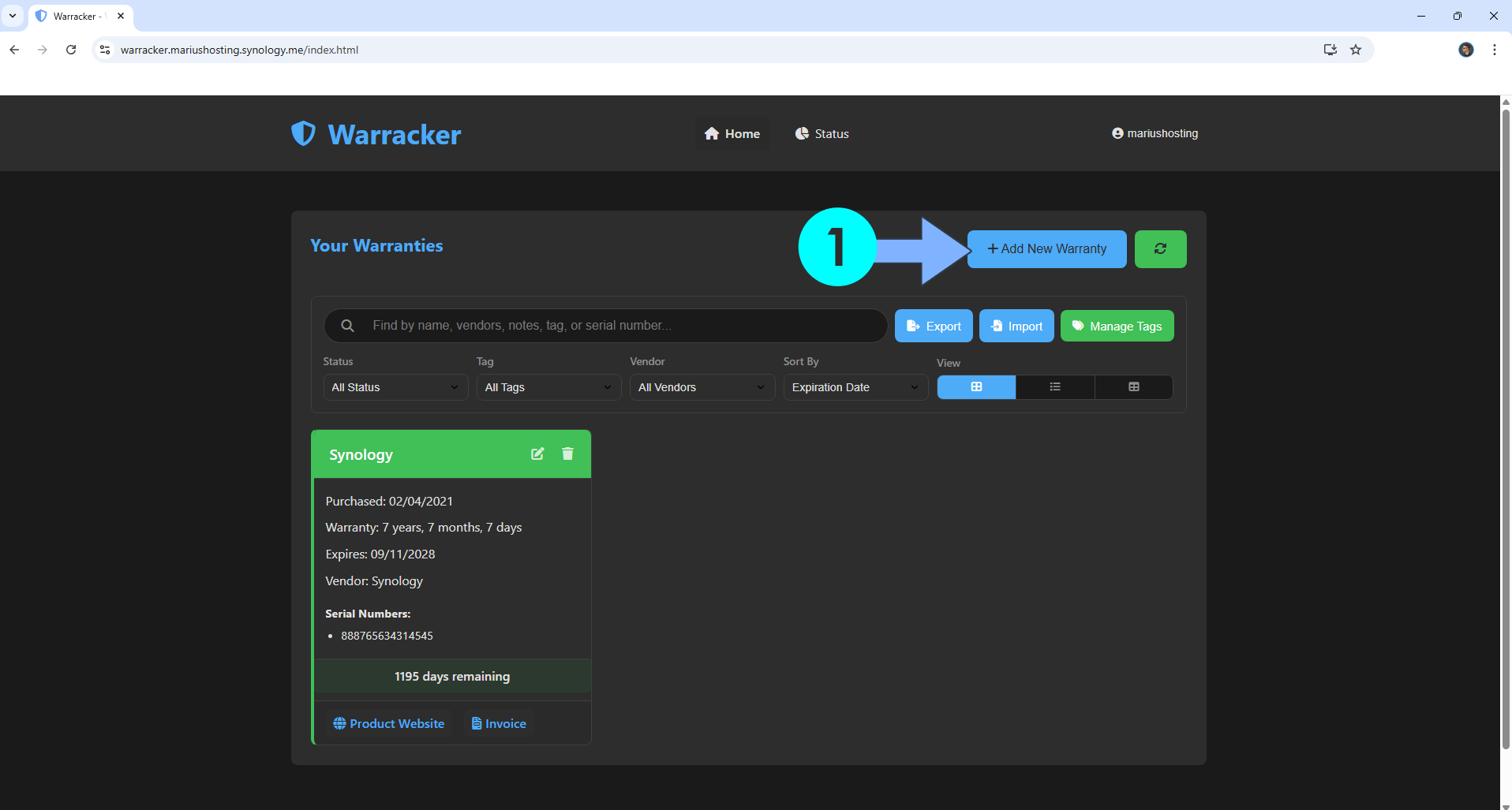
Enjoy Warracker!
If you encounter issues by using this container, make sure to check out the Common Docker issues article.
Note: Find out how to update the Warracker container with the latest image.
Note: How to Back Up Docker Containers on your Synology NAS.
Note: Can I run Docker on my Synology NAS? See the supported models.
Note: How to Free Disk Space on Your NAS if You Run Docker.
Note: How to Schedule Start & Stop For Docker Containers.
Note: How to Activate Email Notifications.
Note: How to Add Access Control Profile on Your NAS.
Note: How to Change Docker Containers Restart Policy.
Note: How to Use Docker Containers With VPN.
Note: Convert Docker Run Into Docker Compose.
Note: How to Clean Docker.
Note: How to Clean Docker Automatically.
Note: Best Practices When Using Docker and DDNS.
Note: Some Docker Containers Need WebSocket.
Note: Find out the Best NAS Models For Docker.
Note: Activate Gmail SMTP For Docker Containers.
This post was updated on Friday / October 31st, 2025 at 3:34 PM
